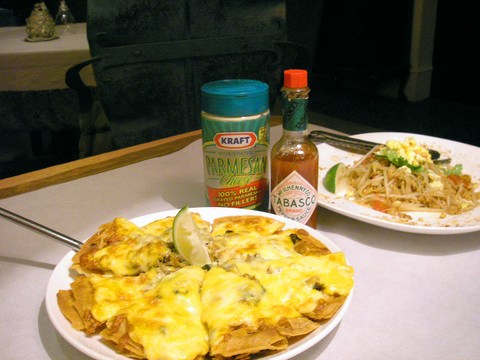Luk Kreung means mixed-blood in Thai, and refers both to mixed ethnicity of restaurant owner Tseng Hsu-min (曾旭民), as well as the mixed parentage of the cuisine that he presents — an innovative combination of Italian and Thai.
When living in Thailand, Tseng, 36, said he frequented a restaurant that cooked Italian food in a Thai style. He believed that this combination would prove popular in Taiwan as well, so two years ago he opened Luk Kreung in Taipei's trendy East District.
On its Chinese-English menu, there is an image of the Virgin Mary, representing Italian food, and one of the Buddha, representing Thai food. These are combined to create his “mixed blood” cuisine.

PHOTO: GINGER YANG, TAIPEI TIMES
This leads to some interesting combinations. There is da-pao pork, a dish of thinly sliced boiled pork with various garnishes, which is a regular feature at many Indo-Chinese themed restaurants. But in this case, it is served on a cornmeal pizza crust (NT$250), with the addition of minced meat and basil. Restaurant manager, Lai Chien-an (賴建安) said it was especially popular as a take out order.
Italian-style fried rice noodles (NT$220) uses anchovies to enhance the flavor of the traditional Thai dish, and can be fine tuned to individual tastes with sugar, ground peanuts and lemon, which are served on the side of the plate. The deep fried trout with Thai apple dressing (NT$480) and grilled beef tenderloin in green curry sauce (NT$700) are worth trying.
Luk Kreung mixes it up with the decor as well; half decorated in palatial Italian style and the other half featuring Thai-themed furniture. The furnishings are uniformly both comfortable and stylish. In fact, the establishment could easily be mistaken for a high-class furniture shop if you don't look too carefully.
There are two rooms for private functions that seat up to 12 people.
The setting is much more luxurious than you would expect for the menu's price range. “We spent more than six months designing the menu and settings. We let our imaginations run wild. Running this restaurant isn't work, it's play,” Lai said. Service is stylish, but not particularly efficient.
After the kitchen closes, Luk Kreung transforms itself into a lounge bar that serves a wide range of spirits and wine. If you want to reserve a seat, call after 5 pm.

Taiwan has next to no political engagement in Myanmar, either with the ruling military junta nor the dozens of armed groups who’ve in the last five years taken over around two-thirds of the nation’s territory in a sprawling, patchwork civil war. But early last month, the leader of one relatively minor Burmese revolutionary faction, General Nerdah Bomya, who is also an alleged war criminal, made a low key visit to Taipei, where he met with a member of President William Lai’s (賴清德) staff, a retired Taiwanese military official and several academics. “I feel like Taiwan is a good example of

March 2 to March 8 Gunfire rang out along the shore of the frontline island of Lieyu (烈嶼) on a foggy afternoon on March 7, 1987. By the time it was over, about 20 unarmed Vietnamese refugees — men, women, elderly and children — were dead. They were hastily buried, followed by decades of silence. Months later, opposition politicians and journalists tried to uncover what had happened, but conflicting accounts only deepened the confusion. One version suggested that government troops had mistakenly killed their own operatives attempting to return home from Vietnam. The military maintained that the

Before the last section of the round-the-island railway was electrified, one old blue train still chugged back and forth between Pingtung County’s Fangliao (枋寮) and Taitung (台東) stations once a day. It was so slow, was so hot (it had no air conditioning) and covered such a short distance, that the low fare still failed to attract many riders. This relic of the past was finally retired when the South Link Line was fully electrified on Dec. 23, 2020. A wave of nostalgia surrounded the termination of the Ordinary Train service, as these train carriages had been in use for decades

Lori Sepich smoked for years and sometimes skipped taking her blood pressure medicine. But she never thought she’d have a heart attack. The possibility “just wasn’t registering with me,” said the 64-year-old from Memphis, Tennessee, who suffered two of them 13 years apart. She’s far from alone. More than 60 million women in the US live with cardiovascular disease, which includes heart disease as well as stroke, heart failure and atrial fibrillation. And despite the myth that heart attacks mostly strike men, women are vulnerable too. Overall in the US, 1 in 5 women dies of cardiovascular disease each year, 37,000 of them